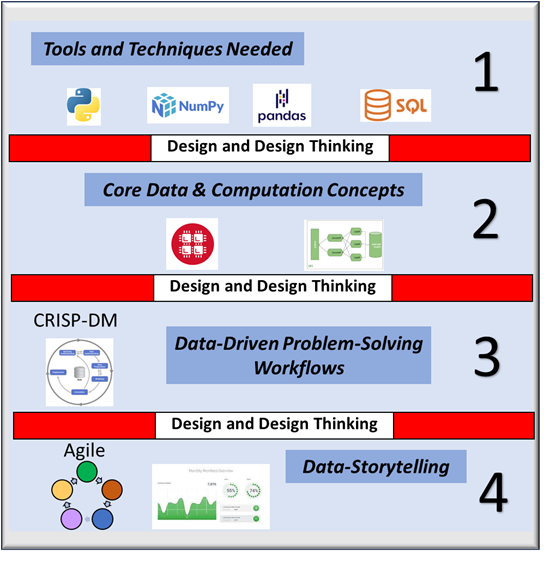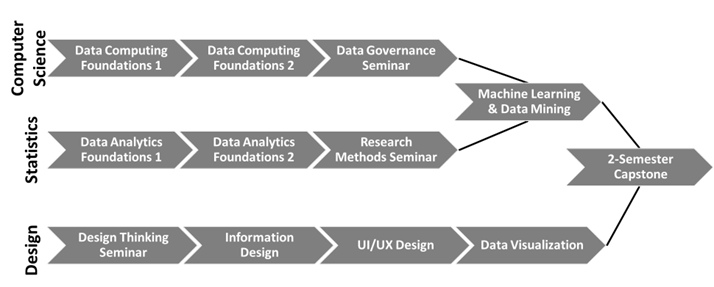MTDA Program
Our Program

No significant background in analytics and programming is required to succeed in our program. We understand that data storytelling is a needed skill in all fields, and we value students’ varied backgrounds.
Explore our courses from Design and The Advanced Computing Center for the Arts and Design (ACCAD), Computer Science, and Statistics to learn how we engage students using an interdisciplinary approach to prepare students to become expert data storytellers.
MTDA Staff

Amber Pasternak joined TDAI as a program coordinator in 2022. She coordinates with the OSU Online enrollment advisors during the application process and works with enrolled students to schedule classes. She is also the instructor for the MTDA Orientation Course.
Future students can reach an enrollment advisor by emailing onlineenrollment@osu.edu.
Courses
Information Design [GRADTDA 5505] (3 CREDIT HOURS): Explores relationship between data visualization and design. Presents programming skills and design strategies to structure and visualize information to create effective communications and stimulate viewer attention and engagement.
Syllabus : http://go.osu.edu/gradtda5505
Design Thinking and Data in Practice [GRADTDA 5627] (1 CREDIT HOUR): This course will explore the design thinking process as it relates to research methods, data collection, and data analysis. The Design Thinking methodology re-frames problems in human-centric ways. We will learn from professionals who utilize design thinking paired with a creative mindset to gather and apply data to solve big problems.”

| 
| |
| Rebekah Matheny | Yvette Shen |
Big Data Computing Foundations 1 [GRADTDA 5621] (3 CREDIT HOURS): This class teaches students how to construct schemas that locate, scrape, process and clean data to develop practical workflows which extract useful information and create usable representations. Focuses on the use of Python and Javascript, as well as tools such as Hadoop and Scala. Current instructor: Brad Coy
Big Data Computing Foundations 2 [GRADTDA 5622] (3 CREDIT HOURS): Part II of a two semester sequence. This class focuses on creating scalable data organizations and access to high-performance computing workflows for Big Data. Cloud computing, data organization, data warehousing, and basic and advanced data structures are emphasized.
Data Governance [GRADTDA 5625] (1 CREDIT HOUR): Trust in data assets is essential. This skills based seminar focuses on practical elements of good data governance, privacy and data security through the use of case studies.
Practical Learning and Mining for Big Data [GRADTDA 5620] (3 CREDIT HOURS): Split into two modules focusing on (1) practical and scalable data mining and (2) scalable machine learning. You’ll learn how to build practical workflows to mine associations and patterns, classify data and build recommendation systems for data and questions.

| 
| 
| 
| |
Greg Ryslik | Brad Coy |
| Tom Marlow | Mark Marshalek |
Data Analytics Foundations 1 [GRADTDA 5401] (3 CREDIT HOURS): This class is all about extracting useful information from data, using data to address work challenges, engaging in data-driven decision making under uncertainty, and identifying, sourcing, manipulating and interpreting data. Software and skills taught in this class include using R programming and analysis using R.
Data Analytics Foundations 2 [GRADTDA 5402] (3 CREDIT HOURS): Part II of a two semester sequence. This class layers in more advanced R programming and analysis using R. It teaches distribution theory via simulation, statistical modeling such as A/B testing, ANOVA, multiple linear regressions, logistic regression and multivariate analysis, while also emphasizing the communication of results.
Research Design [GRADTDA 5626] (1 CREDIT HOUR): The second skills based seminar gives a general overview of research methods which are common across disciplines. Topics include formulating research questions to conducting specific analytical methodologies and writing up/presenting results.
Practical Learning and Mining for Big Data [GRADTDA 5620] (3 CREDIT HOURS): Split into two modules focusing on (1) practical and scalable data mining and (2) scalable machine learning. You’ll learn how to build practical workflows to mine associations and patterns, classify data and build recommendation systems for data and questions.

| 
| 
| |
Elly Kaizar | Thomas Metzger | R. Scott Linder | |
Capstone I [GRADTDA 5911] (3 CREDIT HOURS): Experiential training for students in data analysis with design thinking on non-trivial data. Students formulate data questions and create complete workflows. Emphasis on teamwork, translational competency and professional competency in data rich environments by deploying and using computing technology, data analysis methods and creation of user interfaces.
Capstone II [GRADTDA 5912] (3 CREDIT HOURS): Part II of two semester sequence. Culminating experience through direct engagement with community partners who will formulate challenge questions and provide data. Emphasis on teamwork, translational competency with added emphasis on processing of large data and interpretation of domain specific results. Illustrates data storytelling through deployment of scalable computing technology, data analysis and user interfaces.
Interactive Arts Media [GRADTDA 5141] (3 CREDIT HOURS): Practice in methods to design and craft user experiences and user interfaces for applications that provide cohesive, satisfying experiences for users. Contemporary methods and software to produce application prototypes. Cohort identification and user testing and research.
Emerging Trends in Data Visualization [GRADTDA 5150] (3 CREDIT HOURS): This course enables students to explore new and emerging visualization approaches, topics and trends in visualization research and their applications. Students will research, write about, create, and experience visualization trends.

| 
|
|---|---|
Jeremy Patterson | Joshua McClurg-Genevese Lecturer |
Program Pathways

To accommodate working professionals, we provide options to complete the program. The 5-semester pathway enables students to complete the program in as little as 21 months. We also offer a 10-semester pathway for those who need more time. Classes are offered online both in synchronous and asynchronous format so that students can work through the program on their own schedule while also benefitting from interactions with our team of experts.
Pathways to becoming a Master Data Storyteller

Program Completion: 21 months
Semester 1 - Fall (7 Credit Hours)
- Data Analytics Foundations I
- Big Data Computing Foundations I
- Seminar I: Design Thinking
Semester 2 - Spring (7 Credit Hours)
- Data Analytics Foundations 2
- Big Data Computing Foundations 2
- Seminar II: Research Design
Semester 3 - Summer (7 Credit Hours)
- Practical Learning and Mining for Big Data
- Information Design
Semester 4 - Fall (6 Credit Hours)
- Interactive Arts Media
- Seminar III: Data Governance
- Capstone I
Semester 5 - Spring (6 Credit Hours)
- Emerging Trends in Data Visualization
- Capstone II
Program Completion: 33 months
For the 8-semeseter pathway, students will enroll in the 10-semester pathway and petition to switch to the 8-semester plan in Semester 6. Good standing in the program (GPA >= 3.0) is required.
Semester 1 - Fall (4 Credit Hours)
- Data Analytics Foundations I
- Seminar I: Design Thinking
Semester 2 - Spring (4 Credit Hours)
- Data Analytics Foundations 2
- Seminar II: Research Design
Semester 3 - Summer (4 Credit Hours)
- Information Design
Semester 4 - Fall (3 Credit Hours)
- Big Data Computing Foundations I
- Seminar III: Data Governance
Semester 5 - Spring (3 Credit Hours)
- Big Data Computing Foundations 2
Semester 6 - Summer (3 Credit Hours)
- Practical Learning and Mining for Big Data
Semester 7 - Fall (6 Credit Hours)
- Interactive Arts Media
- Capstone I
Semester 8 - Spring (6 Credit Hours)
- Emerging Trends in Data Visualization
- Capstone II
Program Completion: 45 months
Semester 1 - Fall (4 Credit Hours)
- Data Analytics Foundations I
- Seminar I: Design Thinking
Semester 2 - Spring (4 Credit Hours)
- Data Analytics Foundations 2
- Seminar II: Research Design
Semester 3 - Summer (4 Credit Hours)
- Information Design
Semester 4 - Fall (3 Credit Hours)
- Big Data Computing Foundations I
- Seminar III: Data Governance
Semester 5 - Spring (3 Credit Hours)
- Big Data Computing Foundations 2
Semester 6 - Summer (3 Credit Hours)
- Practical Learning and Mining for Big Data
Semester 7 - Fall (3 Credit Hours)
- Interactive Arts Media
Semester 8 - Spring (3 Credit Hours)
- Emerging Trends in Data Visualization
Semester 9 - Fall (3 Credit Hours)
- Capstone I
Semester 10 - Spring (3 Credit Hours)
- Capstone II
Choosing your pathway is a personal choice and depend on several factors. To help you decide, we’ve broken this down into weekly time commitments based on credit hours.
A credit hour is one hour of weekly instruction plus 2 hours of work required to complete the course. This means that each credit hour will require at least 3 hours of committed time per week.
Every student is different, so this is only a guideline to help you choose the pathway that will work best for you. Other factors, such as your background and your comfort with academic work will influence your decision.
- 5 Semester Pathway
- 6 - 7 Credit Hours / Semester
- Estimated Weekly Time Commitment: 18 - 21 hours / week
- 10 Semester Pathway
- 3 - 4 Credit Hours / Semester
- Estimated Weekly Time Commitment: 9 - 12 hours / week
Still not sure? Don’t worry, you don’t need to decide until you have committed to the program. You will work directly with TDAI staff to make sure you choose the best pathway for your needs.

